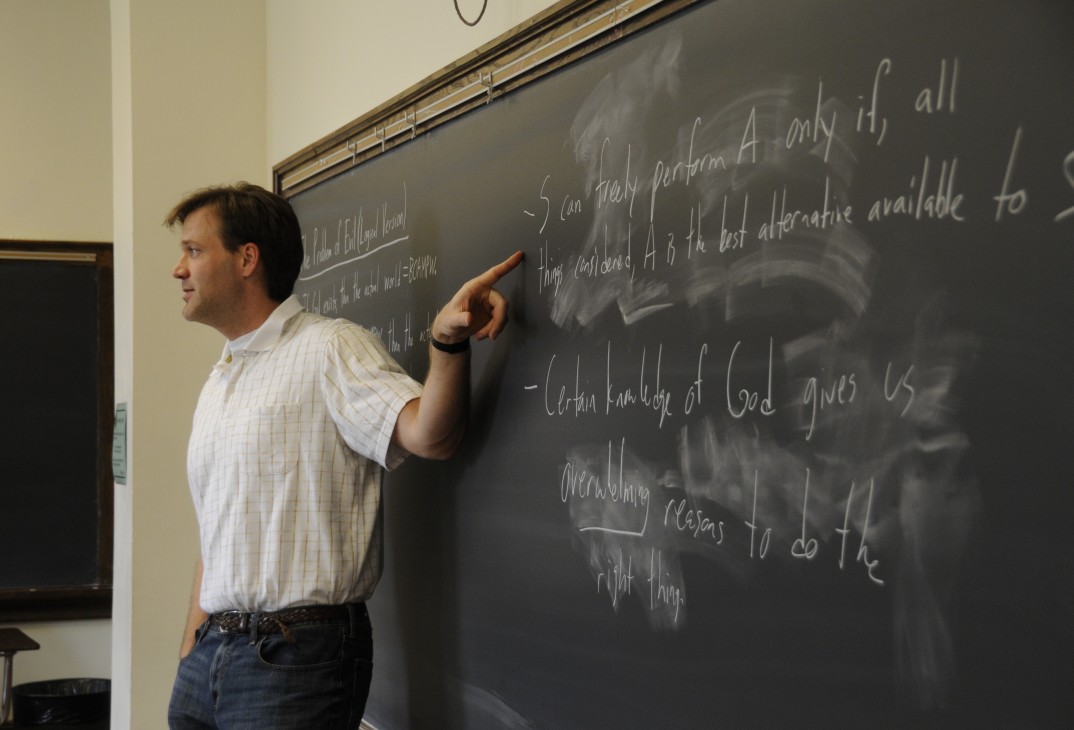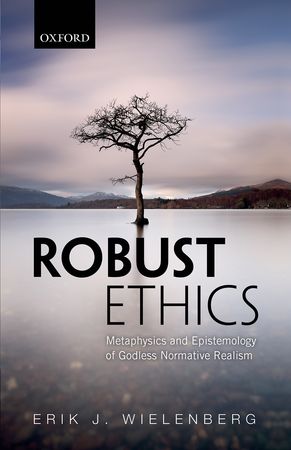Guest post by Rich Cameron, Associate Professor of Philosophy at DePauw University
Scott Wisor recently wrote a post titled “Why Climate Change Divestment Will Not Work” over at the blog for the journal Ethics & International Affairs (EIA). The post is quite provocative. Visit the EIA blog, here, to read it.
Wisor presents himself as convinced that climate change is happening, poses a grave threat, and makes ethical demands on us all. Nevertheless, as his title suggests, he believes that one prominent strategy for generating mass action on climate change is destined for failure: the movement – led by Bill McKibben and his 350.org – to get large universities and investment funds to divest from fossil fuel companies. If fossil-fuel divestment efforts are doomed to fail, then McKibben’s movement functions as a costly distraction from our pressing ethical obligation not just to act but to act effectively. As Wisor puts it, “why spend half a decade or more on a tactic that at best won’t make a difference? Why not direct attention to the more urgent and effective task of placing a price on carbon?”
I have a number of responses to Wisor’s specific arguments, but in this post I’d like to offer two more general reflections aimed at tempering his conclusions. The line of criticism I’ll be pursuing in this post is an odd one – that Wisor’s arguments and conclusions are all too plausible. More specifically, his argumentative target is ill-defined and appears too easily established. When looked at more closely, the real difficulties movements face in achieving success also require more nuanced arguments that a particular movement will fail.
My first point begins by noting that a sober look at the evidence certainly suggests that Wisor’s conclusion is likely to be true. Pick any successful social movement from the past – the civil rights movement, the movement for India’s independence from England, etc. Scholars of social change frequently note that while those movements were in process the odds seemed stacked against them. Moreover, even movements we know (with hindsight) to have been successful seemed destined to fail almost right up until they managed – somehow – to succeed. Indeed, all large scale and eventually successful movements for social change have faced armies of naysayers claiming that the tactics they employed (e.g., non-violent resistance in the cases I’ve mentioned) would not work and that those movements’ efforts served as distractions from other, allegedly more effective measures that people genuinely devoted to the cause should be supporting instead. Perhaps the most eloquent response to this kind of criticism comes in Martin Luther King Jr.’s justly famous “Letter from the Birmingham Jail.” We’re on your side, his critics said, but your tactics are wrong and will backfire.
Antonio Gramsci made a similar point in saying, “I’m a pessimist because of intellect, but an optimist because of will.” The idea in Gramsci’s quote is that rational reflection on the odds of social change will almost always result in a thoroughly justified pessimism. If you’re aware of the obstacles and think about the circumstances carefully you’re sure to come up with a thousand reasons why social change just doesn’t stand a chance. Gramsci acknowledges that effective advocates for social change need to face up to this grim fact. They need the “pessimism of the intellect” so that they know what they’re up against – without this they will be ineffective idealists tilting at windmills. But social change movements do sometimes succeed, and without the benefit of hindsight it’s extremely difficult to tell which movement, if any, is going to pull off a major victory. And that means that people devoted to the hard work of social change need more than just the pessimism that comes from clear-sightedness of the long odds we face. They also need the “optimism of the will,” the willingness to work against long odds with the hope and confidence that some apparently doomed strategy will eventually succeed. To quote Margaret Mead, “Never doubt that a small group of thoughtful, committed, citizens can change the world. Indeed, it is the only thing that ever has.” Without the benefit of hindsight, a strong case can be made that all social movements are doomed to failure, and if that is all Wisor is arguing in the case of the fossil fuel divestment movement then his arguments are both unsurprising and should be of little interest to committed and thoughtful activists. If Wisor is arguing for an interesting claim, it must be not just that we’re justifiably pessimistic about the divestment movement’s odds of success. He must argue for the stronger claim that the movement is actually tilting at windmills, that it is so clearly out of line with reality that it should be viewed as a waste of time even by those with intimate knowledge of the challenges all social movements face.
My second response to Wisor’s argument is generated by asking a simple question: when can we say that a movement has succeeded, that its efforts have “worked”? Wisor’s blog post seems to imply a very demanding standard for movement success – a movement must solve the problem it’s designed to address (in this case climate change). And if this is what success requires then once again Wisor is arguing for a conclusion that is simply too easy. It is widely acknowledged that there are no silver bullets with regard to large problems like this, and in the case of climate change it is also widely acknowledged that it’s too late to “solve” the problem anyway: what we’ve already done commits us to enough warming that dangerous impacts are already unavoidable. Of course, that doesn’t mean we can’t still succeed in mitigating climate change and heading off even more catastrophic impacts, but no one heading up the fossil fuel divestment movement is under the illusion that their efforts will “solve” the problem in this sense.
Still, this isn’t the only metric for success. Activists often view movement success not in these all-or-nothing terms but as, instead, accruing piecemeal, slowly, and building over time. A social movement that doesn’t “solve” its intended problem in the first sense may nevertheless raise awareness (and so make future solutions easier to institute). Movements may build networks of effective and motivated actors (who may work better together in the future because of their present experience). They may convert major institutions and groups to take stands that they otherwise would not have taken (and so, again, make future change more likely). And so on.
All of these things plausibly constitute social movements succeeding, but none of Wisor’s specific arguments for why the fossil fuel divestment strategy “will not work” undermine the idea that the movement has already succeeded – that it has “worked” far beyond the dreams of most movements. According to a report by Arabela Advisors, “181 institutions and local governments and 656 individuals representing over $50 billion dollars have pledged to divest to-date.” Think too of the marches, meetings, media attention, position papers, etc. the movement has generated, and what they mean for better advocacy for policies of all sorts in the future. The point is just that by reasonable standards the divestment movement is already a success, and nothing in Wisor’s piece suggests this movement (and others) can’t build (piecemeal, and bit by bit) on their successes in the future.
Moreover, it is important to note that when Wisor suggests alternative efforts that he thinks stand a greater chance of succeeding he mentions only a “price on carbon” and unspecified “regulatory efforts” to combat climate change. The problem here is that Wisor’s suggested solutions do not constitute ideas for building a movement. To generate a movement you need to mobilize masses of people and institutions and organize them around applying political pressure for change. Of course we should put a price on carbon – but how exactly does Wisor propose that we build the political movement to get that done? When Wisor has an idea for building a powerful movement around putting a price on carbon (or his favorite regulations) and he can show, further, that his new strategy is likely to generate more traction, enthusiasm, and support from grassroots activists and major institutions than the divestment movement has already succeeded in generating then will he have a strong real case for saying that there are more effective strategies we should be pursuing. Saying simply that we should put a price on carbon isn’t even in the same ballpark as building the movement to divest from fossil fuels, however. McKibben’s fossil fuel divestment strategy may not be a silver bullet guaranteed to succeed (no social movement in history ever has been, of course), but it has been a concrete and already effective strategy for bringing together a new, strong, and powerful coalition on climate.
I realize that my fairly general criticisms of Wisor’s post don’t address the specifics of his arguments. For all I’ve said here it remains possible that his specific objections to the fossil fuel divestment movement’s strategies are indeed damning. That is, I have not argued that the fossil fuel divestment movement is not tilting at windmills in a way that anyone who cares about climate action should shun, nor have I argued that it is only beset by the perfectly ordinary sort of “pessimism of the intellect” that beset all social movements (even ones that have succeeded). Still, I hope I’ve clarified the way in which Wisor’s argument seems to aim at a conclusion that is both too easy and too unsurprising. If his arguments are to be of service to his claimed allies in the incipient climate movement they will need to show more than just that there are good reasons for pessimism. He’ll need to show that the divestment movement tilts at windmills. With regard to the former task Wisor’s arguments (unsurprisingly) succeed. With regard to the latter task I’m much less sure.







